By 1957, Studebaker was floating on thin ice. Its bank account was virtually empty, and it was restyling existing models in a desperate bid to stay afloat. One of its offerings for that model year was the Golden Hawk, which sported a supercharged V8 under the hood. Our feature car presents superbly following a recent bare metal repaint and appears to need nothing. It is a striking vehicle that you could park in your driveway today. The Hawk is listed here on Craigslist in San Francisco, California. It could be yours for $35,000 OBO. I must thank Barn Finder T.J. for spotting this classic for us.
The Golden Hawk presents in Midnight Black with contrasting Arctic White on the top and within the concave surfaces of the tailfins. The seller admits the paint isn’t original, but that isn’t bad news. They recently treated it to a repaint, stripping the car to bare metal to achieve a high-end finish. Their effort has been rewarded with a deep shine and no visible faults or flaws. The panels are as straight as an arrow, which seamlessly brings us to the subject of rust. Studebakers from this era were renowned for this, with the floors particularly prone to problems. However, the seller indicates this classic is rust-free, which is a significant factor in determining its ultimate value. The trim looks excellent for its age, and I can’t spot any glass issues.
For purists, the news that this Studebaker is a numbers-matching classic is another positive. Lifting the hood reveals a 289ci V8, and thanks to the addition of a McCulloch supercharger, it should produce 275hp. The ponies feed to the rear wheels via a three-speed automatic transmission, while power steering and power brakes help confirm the car’s luxury leanings. While locating a ¼-mile ET is challenging, the vehicle should leap from 0-60mph in 9.6 seconds before running out of breath at 117mph. The owner states that the car rolls on new Coker tires and is roadworthy. He describes its overall mechanical condition as excellent, making it a turnkey proposition where a buyer could fly in and drive home.
We’ve seen a few Golden Hawks over the past decade at Barn Finds, but this one’s interior makes it one of the best. Its White cloth and vinyl upholstery look excellent, with no wear or stains. The carpet is immaculate, while the dash and pad are flawless. The highlight is the machine-turned dash fascia, which makes a bold statement and is free from physical damage. Thankfully, there are no aftermarket additions that could impact the car’s potential value. It isn’t loaded with luxury features, which was a Studebaker strategy in 1957 to allow reduced sticker prices and greater profit margins. However, it does score an AM radio and a factory clock.
The extent of Studebaker’s battle with the Golden Hawk is abundantly clear when you compare its sales figures with one of its natural competitors in the personal luxury market, the 1957 Thunderbird. While Studebaker sold 4,356 cars, Thunderbird production was 21,380. The writing was on the wall for the company, and it would cease to exist within a decade. There was once a time when I felt I was one of the few people who liked the Golden Hawk’s styling, but recent history suggests I’m not alone. At the dawn of this century, people struggled to give away these classics. Today, they have a strong following. They don’t command the value of an equivalent Thunderbird, but spotless examples occasionally top $40,000. The rust-free status and overall presentation of this car make the asking price look competitive. It will be interesting to monitor the listing to see if someone snaps up this classic.
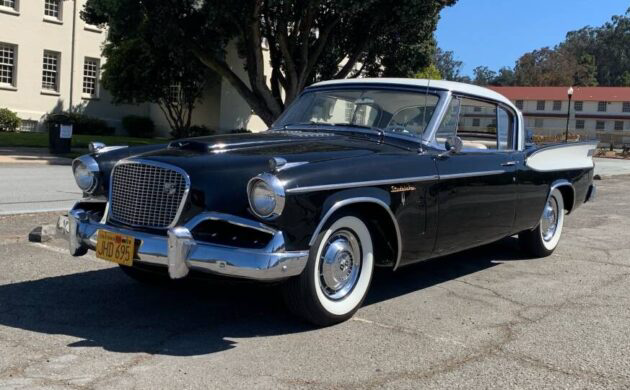
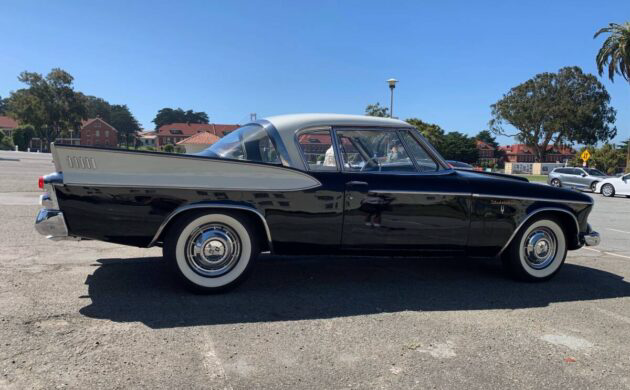
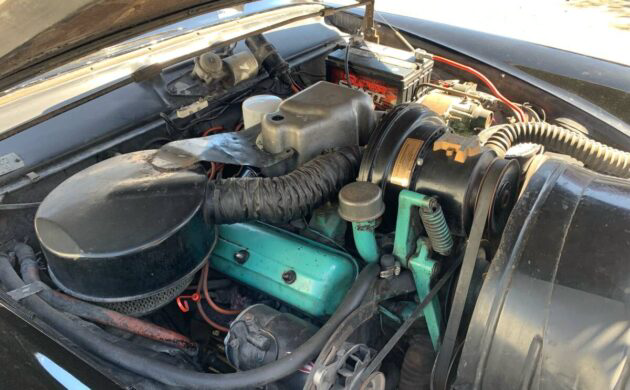
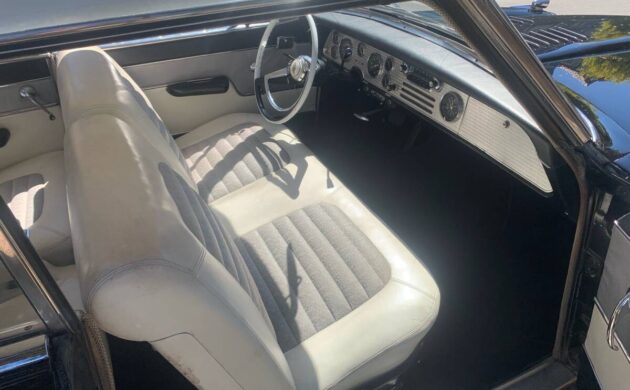
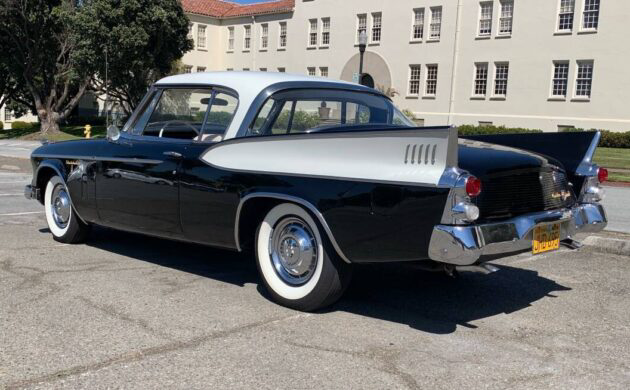





Good looking Studie. Would be nice to see some underside photos. I think for that asking price, though, they should have detailed the engine bay.
Wow! I think this car is beautiful and in fantastic condition. I hope it finds a good home.
The owner probably paid $15,000 – $20,000 for the paint job alone. That makes his $35,000 asking price sound reasonable.
Especially in California. The paint materials are very expensive. I had a guy tell me to go to Vegas or take it to a trusted friend in Mexico.
Today B/F gets a gold star, too many cars I like. This Studabaker is just to cool. I would have to do a few things to it , that I know might cause hate mail, but I am old and have always been a Hot Rodder. I would adjust the stance to be more agressive and update tires and wheels to match that new attitude. Hey, naysayers you can change it back when you buy it.
I had a 57 GH and it did not run out of breath at 117.
Vince,
I found my ’57 GH also was still eager to go at those speeds, but considering the road I was on and the tires it was running, it was ME who ran out of breath and let off on the go pedal!
I was like you Bill I ran out before it did. The same way with my R2 Avanti
Stunning and getting more collectible by the day.
I ask whether or not is the supercharger system fully functional? Why because I owned a ’58 GH for several years and can see that the sc system is missing critical components.
m j,
Having owned multiple Studies and Packards with this engine, from the photos available, all I can see that is perhaps missing is the correct air cleaner. All the examples I’ve checked on the internet show a slightly smaller round air cleaner without that flat bracket to the carburetor housing base. That bracket appears to have been modified to fit. But it should not be too difficult to find the correct version. Everything else looks fine.
Vince, what do you think?
Not the right air cleaner or bracket. If memory serves me right the bracket attaches to the bottom of air cleaner.
This is my car. Nothing is missing with regard to the supercharger. As a matter of fact, it is recently rebuilt.
In the engine photo your cars carburetor plenum is missing it’s one way flapper valve. This rubber flapper valve is located on the top of the plenum. One can see the hole where the valve is supposed to be.
I’ve tried to research this feature by looking at images of other supercharged ’57 Studebaker engines on the internet. I found about a dozen photos.
Some show a hole in the top surface of the plenum. Others show the hole in the front surface. About half of the engine photos show no hole in the plenum at all.
In the photos showing a hole, there doesn’t appear to be anything over or around it. In other words, it just looks like a hole with possibly something beneath it.
What else should be visible other than the hole?
Nick, Vince and I are only trying to provide you with correct information, as we are both very knowledgeable when it comes to the Supercharged Studebaker engines. Take a look at all the Golden Hawk engine compartment photos online, and you will see the air cleaner should be further back toward the firewall, and there should not be a bracket from the top of the air cleaner to the carb pressure box. All the other air cleaners for the S/C 289 mount from the bottom.
Yes, you are correct, nothing is missing, but the air cleaner and mounting is not installed correctly. You have a beautiful car that I would be proud to own if I was 20 years younger. This air cleaner mount is an easy thing to change. From my experience [I’ve bought & sold many cars] the nicer the car is, the more picky the potential buyer tends to be.
They also had the hole and flapper valve in the back side too.
The rubber “flapper valve” is not missing. It’s black rubber and recessed a tad below the 1“ hole in the carb at the top of the chamber. Hard to see that from the Craigslist photo.
That “flapper valve” is often confused as a pressure relief valve if the supercharger “over boosts”, but it is not. The valve is designed to just be open enough to equalize pressure between the outside air and the air inside the carb housing when the engine is NOT running.
As soon as the car is started, the supercharger “low pressure” air boost* forces the valve closed. It’s working fine if without the engine running, you can insert a regular piece of paper into the gap between the housing and the rubber flapper disc at the edge furthest from it’s spring base, and there is no resistance.
*The supercharger always produces a slight pressure boost to make up for the air restriction situation due to the air going thru the supercharger and into the carb plenum chamber. This is known as “low boost”. This is why it’s important to keep the supercharger belt in place. Running the engine without the belt for long periods of time/mileage will allow unfiltered air to be sucked into the carb housing thru this valve.
Imagine the amount of air being sucked into the engine at 55mph, and one can imagine that flapper valve being pulled way down into the housing because the supercharger was unbelted and couldn’t supply air at the rate needed by the engine.
In the 1980s I remember a supercharged ’57 Packard Clipper coming into my shop that was driven for years without the supercharger belt, and the flapper valve was held open from decades of dirt encrusting the valve, and of course the carb was equally dirty inside & out.
Gas mileage is also worse without the belt.
Hi Bill,
I do understand that potential buyers can be picky with a car like this and with the price I’m looking to get. The engine compartment is the weak link, and does needs to be cleaned up and straightened out with any inconsistencies. I have had a couple of these including a Packard Hawk so I am familiar with the supercharger set up and the bracket on my air cleaner is odd. The air cleaner itself seems correct but that amateur welded on bracket that goes to the carb chamber looks out of place. On my other cars, i don’t remember any bracket at all going towards the carb. The remedy would be to remove that bracket I suppose but you and Vince seem to think that the air cleaner itself is incorrect. If so, what would the application be for my air cleaner? Also, the correct air cleaner is not easy to find. Thank you for your knowledge and info. Nick
Nick,
Thinking about it and looking closer at the air cleaner housing with that raised section leading to the outlet hose, I think the location it’s in now [closer to the camera] has given the impression that it’s bigger, and I suspect it may be a simple case of the wrong location making it appear the wrong size.
I’m sure that bracket is not correct unless it could be a very early production car, and perhaps only a few were produced with that big bracket. That said, I still think it was created from something else, as it looks home-made.
I would suggest you take a set of measurements of your air cleaner housing and ask another Golden Hawk owner to confirm the measurements. If they check out as the same, then it’s a case of finding [or making] the correct air cleaner mounts/brackets and removing the bracket now in use.
I assume you’re an SDC member, and I believe they have a roster keeper for Golden Hawks, his name is David Johns, and his contact info is on the Golden Hawk page. He will likely be of help figuring it out.
FWIW, I used to have a 1956 Sky Hawk hardtop with the 4 barrel dual exhaust engine, Twin Traction, and 3-speed w/OD. I actually out ran a couple ’57 & ’58 Golden Hawks equipped with the B/W automatic, in that Turquoise & White Sky Hawk. I wish I still had that car, it had only 54,000 garage-kept miles, and was basically all original.
I looked at it again this morning and the two holes in the bracket line up perfectly with two studs on that side of the carb chamber if the bracket is bent further down. I’m going to try bending it down and secure it with the nuts that hold the chamber. That should at least make it look more tidy and the new owner can look for another air cleaner if this one is bothersome. It’s a minor issue but you’re right, for what I’m asking for the car, small issues can become big issues. Hopefully I can find out if that bracket might be original. And yes, I am an SDC member. Thanks again, Nick
Nick [and everyone else here on B.F.],
This is a classic example of why research is so important. If that bracket matches almost perfectly with the carb housing bolts, then it’s worth doing the research to establish if it might have been an early example of a Golden Hawk.
We mustn’t forget that this was the first year Studebaker used the McCulloch unit, and it’s possible for a few early examples, the air cleaner was in a different location. Perhaps they found it could rub against the underside of the hood on hard acceleration and they moved the air cleaner location further back on the engine.
That said, between the SDC Golden Hawk page and the Studebaker Museum in South Bend, I suspect the answer might be found. I would love to know what happens, either from you or the next owner.
Research can be very important. In 1970 I found [and later purchased] a 1948 Packard 6 cylinder sedan with an all brown vinyl interior. Packard “experts” said it had to be an export car. As it had a vacuum operated opening rear window identical to those in the 1947 Taxicabs, I felt it had to be a Packard Taxicab, but everyone said the last year for them was 1947.
When I was finally able to buy the car, I noticed the serial number began with 2286. The 1947 Packard Taxicabs started with 2186 [the 86 denoting a taxicab]. So I was sure it was a genuine 1948 Packard 6 cylinder taxicab, something that no one in the Packard Club back in the early 1970s knew existed.
Had I simply ignored that old 6 cylinder Packard sedan, the car would have certainly been scrapped. But because I did the research I was ultimately able to track down Mr. Bob King, the last President of Packard Federal, and ended up with what was left of the company records and paperwork. Bob gave me a Packard Federal brochure for the 1948 Taxicab that proved their existence. [Packard Federal was the commercial and export division of the Packard Motor Car Co.]
Today there are only 2 1948 Packard taxicabs known to exist.
Very interesting story Bill on the Packard! On my Golden Hawk, I bent the bracket down and bolted it onto the carb chamber. I haven’t researched the originality of it yet but plan to. I took fresh photos of the engine to show the bracket in its bolted down position. The Craigslist ad now has the new photos.
Nick,
Since the car still has the original bottom support, I’ll bet a former owner lived on a dirt or gravel road with a washboard surface that caused the air cleaner assembly to vibrate, so he added a brace. This situation is fairly common on older vehicles that drove higher speeds on unimproved roads, especially trucks. I have seen many older trucks with additional support brackets for things like the old canister oil filter housings, radiator supports, etc.
Today most people don’t know or remember that once away from the city and suburbs, up until the 1970s most rural roads were still unimproved.
Nick,
Thanks for the additional photo on Craigslist. I was able to blow it up to see the bracket clearer. What I see is a heavy steel [1/8″ or thicker] bracket welded to a much thinner air cleaner housing [20 gauge?].
There are 3 basic ways of welding those metals; Arc, Spot, and Gas. The problem with Arc welding metals of vastly different thicknesses is the thin sheet metal housing will burn thru before the heavier bracket fuses the 2 pieces together, so as far as a production method, that’s not going to be realistic.
That leaves Gas or Spot welding. Spot welds leave specific heat/pressure indentations where the welding occurred, and I see no evidence of spot welding. What I do see is evidence of gas welding, and it’s likely the attaching process used brass welding rod to “weld” the metals together [also known as “Brazing”].
While it’s possible to gas weld the 2 pieces together, brazing is not the typical choice in a situation like this one, as brazing is not as strong. With the air cleaner hanging off an engine that is vibrating, the failure rate would be very high. Plus, spot welding is the preferred choice because it’s also fast and very strong, 2 important production considerations.
The 1957 model year was when A/C, Purolator, and Fram first introduced folded paper air cleaner elements on US cars, and if I remember correctly, A/C supplied the air filters & housings to Studebaker. This would have been a production item, and almost certainly would have involved the bracket and filter housing being spot welded together at the A/C subcontractor level.
The bracket on your car appears to have been brazed to the air cleaner housing. While I am 99% sure it’s not a factory produced assembly, I have seen rare instances where such welds were applied. I still think it’s worth checking out because someone went to a lot of work to make the bracket.
What’s odd is that I already have the lower bracket that bolts to the air cleaner that in turn bolts onto the valve cover. I can’t imagine why you would need extra stability and add that welded on bracket which bolts onto the carb chamber. I’m fine with it now that it’s bolted down, original or not.
Packard Federal 1948 Taxicab brochure cover
The car is originally from Montana so that might explain the additional support with the extra bracket on the air cleaner, especially if the car resided in a rural area.
Nick [and others with questions about Studebakers and Packards],
My email is [email protected], and I welcome people to contact me about those [and other rare vehicles].
I just noticed the valve covers are not black. I have never seen this color on them. Nick even though your car has been nitpicked it is still a very nice car. I would be glad to have it parked in my garage. I have been a SDC member since 1969.
The paint looks original on the valve covers but yes, supposed to be black. Engine number matches the production order. More research needed to figure out what’s going on with that color. Engine color seems the same.
No question about engine color. I suspect that the engine has had major work on it and was repainted.
Not so sure the engine has ever ever been opened up. Many years of caked on grease on the engine block. Wiping away some grease revealed the original turquoise block color.